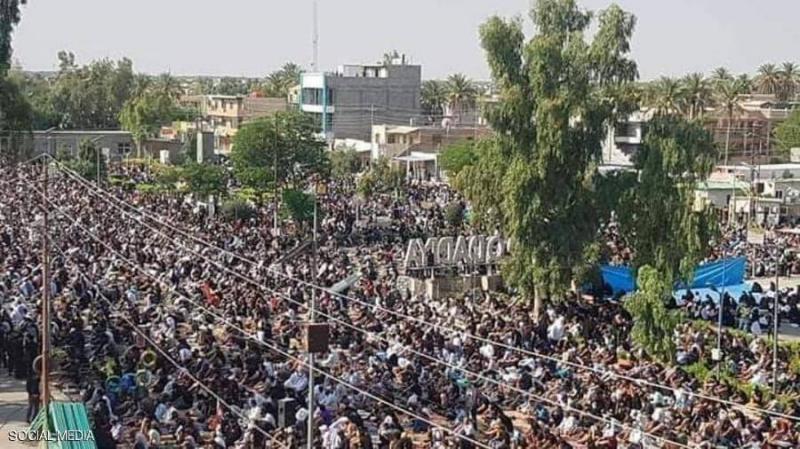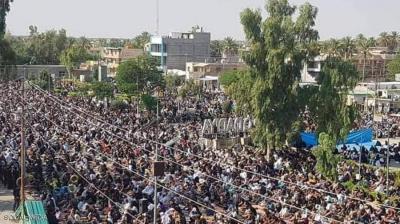A week after the security tensions that engulfed Diyala province in eastern Iraq, taking on a sectarian dimension, thousands of Iraqis from both Sunni and Shia communities participated in a joint Friday prayer in the city of Muqdadiyah, the provincial center. This Friday prayer was held following a call from the leader of the Sadrist movement, Muqtada al-Sadr, along with hundreds of appeals made by Iraqi politicians, intellectuals, and religious figures over the past few days, urging the rejection of sectarianism and violence, and promoting dialogue and partnership between the two communities within the province and across various regions of Iraq.
The central Husayniyah of Muqdadiyah overflowed with thousands of attendees from the morning, who filled the entire courtyard of the mosque, the outer squares, and the surrounding streets. Worshippers flocked from different towns and cities within the province, in addition to those coming from other Iraqi provinces, especially the capital, Baghdad.
The streets of Muqdadiyah had witnessed a heavy security presence since dawn to maintain safety and prevent any breaches during the gathering. Various homes, shops, and cars were filled with songs and chants calling for Iraqi national unity and brotherhood among all Iraqis. Many were distributing water, sweets, and some fruits to those heading to the joint prayer location, and ululations could be heard from time to time.
Sitam Al-Shayyabi, an architect and one of those who came from Baghdad with his two young sons to participate in this communal prayer, stated in an interview with "Sky News Arabia": "Like hundreds of thousands of Iraqi families, my wife and I are not from the same sect, as my father was not either. The events that Diyala province has witnessed over the past days, along with the heated discussions on social media, have affected every Iraqi household, including mine, where we have four children in their youth and adolescence. Today, I brought my two eldest sons to experience an occasion and moments that strengthen their feelings and thoughts that transcend all forms of sectarianism and racism."
The imam of the joint sermon and prayer, Sheikh Mustafa Al-Tamimi, called for community unity, the rejection of disagreements, and the preservation of civil peace.
Diyala province had witnessed fierce violent events at the end of October. After a group of ISIS fighters attacked the village of Al-Rashad near Muqdadiyah, assassinating 13 civilians from the village, armed groups, including villagers, launched an assault on the nearby village of "Nahr Al-Imam", killing dozens from that village, as the attacking militants accused the villagers of facilitating and turning a blind eye to the actions of ISIS fighters.
In the aftermath of this tragic incident, discussions emerged in Iraq regarding the role of the Iraqi army and security forces in protecting civilians from sectarian reprisals carried out by militants linked to popular mobilization factions. Reports indicated that around five thousand soldiers and security personnel were present in the area during the execution of those retaliatory operations.
Other Iraqi voices called for a transparent and decisive investigation into the events that occurred in the province at that time, to define the tasks and authority of the army and security forces in the province, to protect civilians from attacks by both ISIS militants and sectarian militias, and to avoid covering the essence of the issue in the province with some celebratory events, such as joint evenings and prayers.




